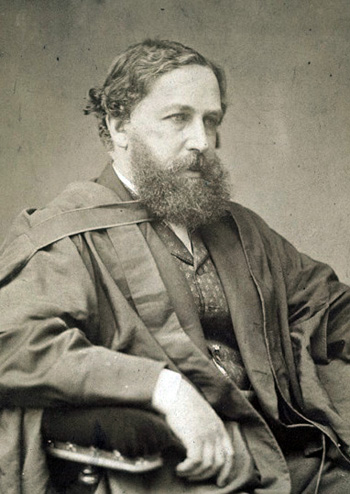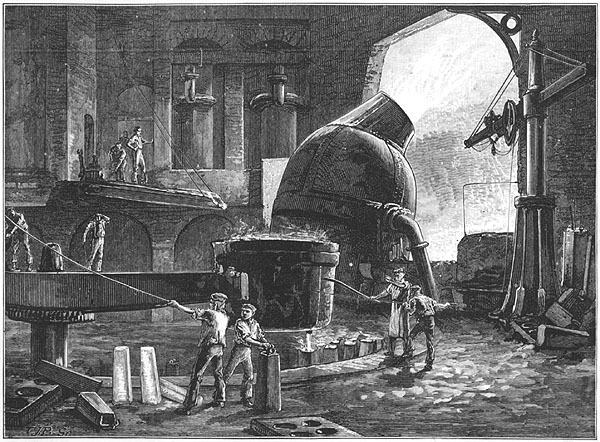Glorious steam now meant power-unlimited. Steam was the answer to the centuries-old quest. Still, some more-cautious voices in England said, "Wait a minute; our mines can't last forever. Once we've cleaned out the seams in Devon and Cornwall, then what!?" Of course you and I know that worldwide coal reserves, even today, will last quite a bit longer.
But we also realize that there's only so much of any fossil fuel. And when it's gone, it's gone. We've always thought that one way to cope with increased consumption is with increased efficiency. That was certainly the thinking in the early 19th century. The first Newcomen engines had efficiencies around a third of one percent. By the time James Watt had finished his improvements, steam engines were fifteen times as efficient.
But two catches: First, the laws of thermodynamics, which weren't yet known, would not allow that improvement to go on forever. Today, our best engines are lucky to make half of coal's energy into useable power. That's a lot better than Watt's engines and a huge improvement over Newcomen. But it's also very nearly the end of the road of improved efficiency.
The other catch might be a bit of a surprise. A British mathematician, William Stanley Jevons, wrote a book titled The Coal Question, in 1845. Watt's new engines were eating up English coal. Once it was gone, Britain would be in trouble. And Jevons wrote, "... some day our coal seams [may] be found emptied to the bottom, and swept clean like a coal-cellar. Our fires and furnaces ... suddenly extinguished, and cold and darkness ... left to reign over a depopulated country."

William Stanley Jevons [Image courtesy of Wikimedia Commons]
He knew that people were looking to more efficient steam engines to solve the problem. Jevons may not've realized that steam engines were already closing in on thermodynamic limits of efficiency. But he did see that increased efficiency would not save us in any case. Look at Watt's engines, he said. They were invented because the older Newcomen engine was so inefficient. Did Watt cut coal consumption by improving efficiency?
Quite the contrary: By making steam power so much more efficient, he spread the use of steam throughout the land. Coal consumption was skyrocketing. A few years later Henry Bessemer invented a new highly energy-efficient scheme for smelting steel. Jevons's argument played out once more. Now we had cheap steel and began making everything from it — plows, toys, even store fronts. Energy-efficiency had again increased the consumption of coal (as well as iron ore).
Of course this is pretty obvious when we think about it. Yet we keep looking to solve our consumption problems with greater efficiency. Right on the heels of Jevons, Karl Marx constructed another efficiency argument. Marx believed that production would become so efficient as to eliminate most work. Few failures of Marxist theory were as dramatic as this one. Industrialization freed us all right. It freed us to find other things to work at.
The Bessemer Process, from Great Industries of Great Britain, 1877-1880
All this was just after William Blake had said, "Energy is eternal delight." We were dancing in our delight with energy. Our ecology and our survival have been riding that delightful downward roller coaster of energy production and consumption ever since.
Still, economists Herbert Inhaber and Harry Saunders read Jevons and offer hope. Sure, they're certain that we'll never create a decent world with laissez-faire mechanisms. But they also remind us that we will conserve energy when we, as individuals, want to conserve energy. And want to, we surely will — sooner or later.
That obviously could not happen in Jevons' time — any more than it's happened in ours. We were all having too much fun — and we still are. For a season, technology opened up new sources as fast as we craved them. Mining methods improved, geological exploration found new seams. Then, to cap it all off, a new fuel arose: Petroleum! And new engines appeared to utilize it.
Petroleum was yet another 11th-hour save in an energy crisis. Jevons had correctly foreseen a crisis; but now that crisis would be kicked down the road for you and me to deal with. At the time, new coal fields, then oil, solved the problem. It seemed that our moment of delight would, indeed, be eternal.
Sources
Inhaber, H., and Saunders, H., Road to Nowhere. The Sciences, Vol. 34, No. 6, November/December 1994, pp. 20-25.
See also Wikipedia's Jevons Website.
